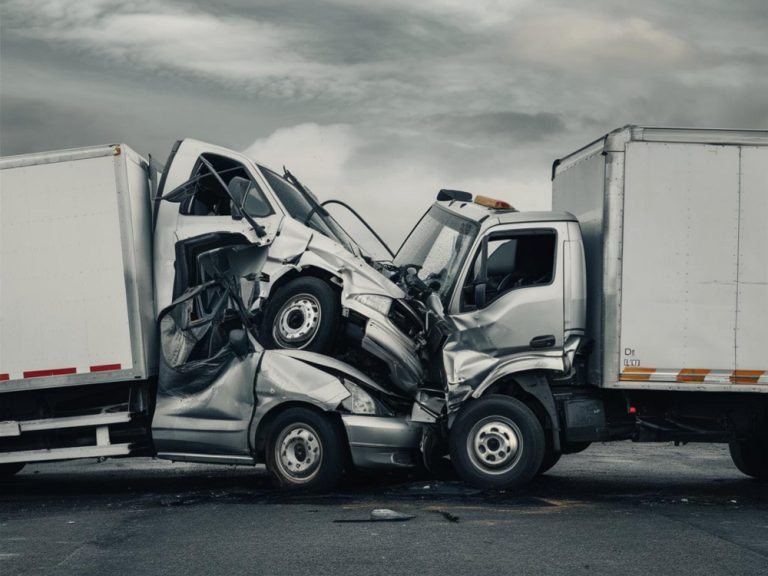From investigating the accident scene to negotiating settlements or litigating in court, their role is crucial in ensuring clients receive fair compensation for damages, including medical expenses, lost wages, and pain and suffering. Commercial truck accident lawyers strive to protect the rights of their clients and hold responsible parties accountable for negligence or misconduct, offering comprehensive legal support throughout the often-challenging aftermath of these serious accidents.
What Is A Commercial Truck Accident?
A commercial truck accident is a collision involving a large vehicle for transporting goods or passengers for commercial purposes. These trucks include tractor-trailers, semi-trucks, delivery trucks, and other vehicles exceeding a certain weight and size threshold.
Causes Of Commercial Truck Accident

Commercial truck accidents can occur due to a variety of factors, including:
- Driver Fatigue: Truck drivers often work long hours and may exceed legal limits for driving time, leading to fatigue, decreased alertness, and slower reaction times.
- Speeding and Aggressive Driving: Pressure to meet delivery deadlines may cause drivers to speed or engage in aggressive driving behaviors, increasing the risk of accidents.
- Distracted Driving: Activities like using mobile phones, eating, or adjusting GPS devices can distract truck drivers from focusing on the road and other vehicles.
- Improper Loading or Cargo Securement: Incorrectly loaded or unsecured cargo can shift during transit, causing the truck to become unstable or difficult to control.
- Mechanical Failures: Issues with brakes, tires, steering mechanisms, or other mechanical components can lead to loss of vehicle control and accidents.
- Poor Weather Conditions: Adverse weather such as rain, snow, ice, or fog can reduce visibility and traction, increasing the likelihood of accidents.
- Inexperienced or Inadequately Trained Drivers: Lack of experience or insufficient training in handling large commercial vehicles can contribute to accidents, especially in challenging driving conditions.
- Drug or Alcohol Use: Substance abuse by truck drivers can impair judgment, coordination, and reaction times, posing serious risks on the road.
- Failure to Follow Safety Regulations: Non-compliance with federal and state regulations governing hours of service, vehicle maintenance, weight limits, and other safety standards can lead to accidents.
- Roadway Conditions: Poorly maintained roads, construction zones, and inadequate signage or lighting can create hazardous conditions for truck drivers and increase the likelihood of accidents.
Complications In A Commercial Truck Accident
Commercial truck accidents can lead to various complications, both for the victims involved and in terms of legal and logistical challenges.
Here are some key complications that can arise:
- Severe Injuries and Fatalities: Due to the size and weight of commercial trucks, accidents often result in serious injuries or fatalities for drivers and passengers of smaller vehicles involved.
- Complex Liability Issues: Determining liability in commercial truck accidents can be intricate. It may involve multiple parties, including the truck driver, trucking company, cargo loaders, maintenance providers, and manufacturers of truck parts.
- Regulatory Compliance: Commercial trucks are subject to numerous federal and state regulations governing driver qualifications, hours of service, vehicle maintenance, and cargo securement. Non-compliance with these regulations can complicate legal proceedings.
- Insurance Coverage: Insurance policies in commercial truck accidents can be complex, involving different types of coverage. Coordination among various insurers may be necessary to cover damages adequately.
- Evidence Collection: Gathering evidence in commercial truck accidents is crucial but challenging. It may involve obtaining data from onboard electronic logging devices, vehicle black boxes, witness statements, and accident reconstruction reports.
- Long-Term Consequences: Victims of commercial truck accidents may face long-term consequences such as chronic pain, disabilities, psychological trauma, and financial hardship due to medical bills, lost wages, and ongoing rehabilitation.
- Legal Proceedings: Lawsuits stemming from commercial truck accidents can be lengthy and complex. They may involve negotiations with insurance companies, depositions, expert testimony, and potentially a trial if a settlement cannot be reached.
- Public Safety Concerns: Commercial truck accidents can impact public safety, especially if they occur in densely populated areas or on major transportation routes, leading to traffic delays and potential hazards for other motorists.
Who Is The Truck Accident Lawyer?
A truck accident lawyer is a legal professional who specializes in representing clients involved in accidents with commercial trucks, such as tractor-trailers, semi-trucks, and delivery vehicles. These lawyers have expertise in the specific laws and regulations governing commercial trucking, including federal and state safety standards, hours of service regulations, and insurance requirements. They handle cases involving serious injuries, fatalities, property damage, and complex liability issues.
Truck accident lawyers investigate the accident thoroughly, gather evidence, negotiate with insurance companies, and litigate in court if necessary to secure compensation for their client’s medical expenses, lost wages, pain and suffering, and other damages. Their goal is to protect the rights of accident victims and achieve the best possible outcome for their clients amidst the complexities of truck accident litigation.
What Are The Characteristics Of A Truck Accident Lawyer?

Effective truck accident lawyers possess several key characteristics that enable them to handle complex cases and advocate effectively for their clients:
- Specialized Knowledge: They have in-depth knowledge of trucking laws, regulations, and industry standards specific to commercial vehicles.
- Investigative Skills: They are skilled in conducting thorough investigations, gathering evidence, and analyzing data such as black box recordings and maintenance records.
- Negotiation Expertise: They excel in negotiating with insurance companies and other parties to achieve fair settlements for their clients without the need for litigation, when possible.
- Litigation Experience: They are prepared to take cases to trial if necessary, with experience in presenting compelling arguments and cross-examining witnesses.
- Compassion and Empathy: They demonstrate empathy towards their clients’ situations, understanding the physical, emotional, and financial toll of truck accidents.
- Communication Skills: They communicate clearly and effectively with clients, explaining legal concepts and providing updates on case developments.
- Resourcefulness: They are resourceful in leveraging expert witnesses, accident reconstruction specialists, and other professionals to strengthen their cases.
- Attention to Detail: They pay meticulous attention to detail in documenting injuries, damages, and liability issues to build a strong case.
- Client Advocacy: They are committed advocates for their clients, fighting for justice and fair compensation in the aftermath of devastating truck accidents.
Role Of Truck Accident Lawyer
The role of a truck accident lawyer is multifaceted and crucial in helping clients navigate the aftermath of a commercial truck accident.
Here are the primary roles they play:
- Legal Representation: Truck accident lawyers provide legal representation to clients who have been injured or suffered losses due to a truck accident. They advocate for their client’s rights and interests throughout the legal process.
- Investigation: They conduct thorough investigations into the accident, gathering evidence such as police reports, witness statements, and data from the truck’s black box. This helps determine liability and build a strong case.
- Determining Liability: Truck accident lawyers identify and assess liability, which can involve the truck driver, trucking company, vehicle manufacturers, maintenance providers, or other parties responsible for the accident.
- Navigating Complex Regulations: They are knowledgeable about federal and state regulations governing the trucking industry, including safety standards, hours of service rules, and licensing requirements.
- Negotiation and Settlement: They negotiate with insurance companies and other parties on behalf of their clients to secure fair settlements that cover medical expenses, lost wages, pain and suffering, and other damages.
- Client Support: They provide guidance, support, and clear communication to clients throughout the legal process. This includes explaining legal options, updating clients on case developments, and addressing their concerns.
- Ensuring Fair Compensation: Truck accident lawyers work to ensure their clients receive fair compensation for their injuries, financial losses, and other damages resulting from the accident.
Eligibility To Become A Truck Accident Lawyer
Educational Requirements
To become a truck accident lawyer, the first step is to obtain a bachelor’s degree from an accredited university. There is no specific undergraduate major required, coursework in areas such as political science, history, or criminal justice can be beneficial. Aspiring lawyers must attend law school and earn a Juris Doctor (J.D.) degree, a three-year program. Law school provides a comprehensive education in various areas of law, including tort law, which is relevant to personal injury and accident cases.
Licensing
After completing law school, graduates must pass the bar exam in the state where they intend to practice. The bar exam is a rigorous test that assesses knowledge of state-specific and general legal principles. Passing this exam grants the individual a license to practice law in that state. Some states require passing the Multistate Professional Responsibility Examination (MPRE), which tests knowledge of professional ethics.
Specialization and Experience
Gaining experience in personal injury law, specifically related to truck accidents, is highly advantageous. This can be achieved through internships, clerkships, or entry-level positions at law firms specializing in personal injury or transportation law. Practical experience helps in understanding the nuances of truck accident cases, including dealing with insurance companies, understanding trucking regulations, and handling complex liability issues.
Continuing Education
Lawyers must engage in continuing legal education (CLE) to stay updated with changes in laws and regulations pertinent to truck accidents and personal injury law. Many states require a certain number of CLE hours annually to maintain licensure. Specialized courses or certifications in personal injury law can further enhance a lawyer’s expertise and credibility in handling truck accident cases.
FAQs
What should I do immediately after a truck accident?
Ensure your safety and call emergency services. Seek medical attention, even if you don’t feel seriously injured. Document the scene by taking photos and gathering contact information from witnesses.
How is a truck accident different from a car accident?
Truck accidents often involve more severe injuries due to the size and weight of commercial trucks. They also involve complex regulations and multiple parties, such as the trucking company, driver, and manufacturers, which can complicate the case.
Who can be held liable in a truck accident?
Multiple parties may be liable, including the truck driver, trucking company, cargo loaders, maintenance providers, and truck or parts manufacturers.
What compensation can I receive after a truck accident?
Compensation may cover medical expenses, lost wages, pain and suffering, property damage, and, in some cases, punitive damages. The amount depends on the specifics of your case and the extent of your injuries and losses.
How long do I have to file a claim after a truck accident?
The statute of limitations for filing a truck accident claim varies by state but is generally between one and three years.
Seeking For Help. Contact Us Our Commercial Truck Accident Lawyer
If you or a loved one has been involved in a commercial truck accident, our experienced truck accident lawyers are here to help. We understand the complexities and challenges these cases present and are committed to securing the compensation you deserve. Contact us today for a free consultation, where we will review your case, answer your questions, and discuss your legal options.
Interested Reads:




